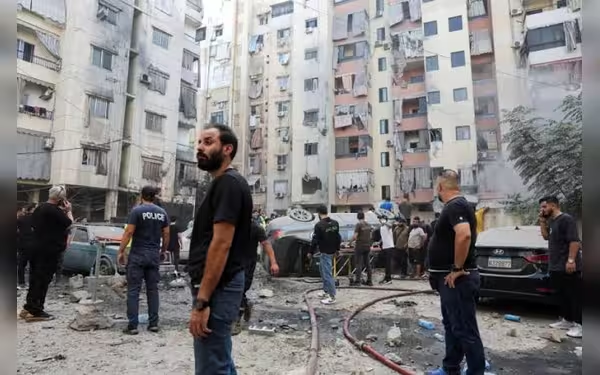Saturday, November 16, 2024 06:53 PM
Hezbollah Commander Killed in Israeli Airstrike on Beirut
- Top Hezbollah commander Ibrahim Aqil killed in airstrike.
- At least 66 injured, nine critically after the strike.
- Hezbollah vows retaliation following Israeli military operation.
 Image Credits: thefrontierpost
Image Credits: thefrontierpostA top Hezbollah commander was killed in an Israeli airstrike in Beirut, escalating the ongoing conflict and resulting in numerous civilian injuries.
In a significant escalation of the ongoing conflict between Israel and Hezbollah, a recent airstrike in Beirut has resulted in the death of a top Hezbollah commander, Ibrahim Aqil, along with at least 13 others. This incident marks a troubling development in a year-long confrontation that has seen increasing violence and instability in the region.
The airstrike occurred on a Friday, targeting a building in the southern suburbs of Beirut, an area known to be a stronghold for Hezbollah. The Israeli military confirmed that Aqil, who was the acting commander of the Radwan special forces unit, was killed alongside other senior commanders during a meeting. This operation is seen as part of Israel's broader military campaign aimed at securing its northern border and countering threats from Hezbollah, which is backed by Iran.
Hezbollah acknowledged Aqil's death, describing it as a "treacherous Israeli assassination." The group has been involved in a series of retaliatory actions, including rocket fire into northern Israel, following the airstrike. The Lebanese health ministry reported that at least 66 individuals were injured, with nine in critical condition, highlighting the devastating impact of the strike on civilians.
Prime Minister Benjamin Netanyahu of Israel stated that the country's military objectives are clear, emphasizing that actions taken are necessary for the safety of Israeli citizens. The Israeli military has indicated that it will continue its operations until it feels secure from threats posed by Hezbollah.
This recent airstrike is not an isolated incident; it follows a pattern of violence that has escalated since the outbreak of the Gaza war nearly a year ago. The conflict has forced tens of thousands of people to evacuate their homes on both sides of the Israel-Lebanon border, creating a humanitarian crisis that continues to unfold.
Local residents in Beirut expressed their fears and frustrations, with one saying, "We are not afraid, but we want a solution. We cannot continue with the country like this." This sentiment reflects a growing desire for peace amid the chaos, as the cycle of violence shows no signs of abating.
The United Nations has also voiced concerns, with the Special Coordinator for Lebanon calling the airstrike part of an "extremely dangerous cycle of violence with devastating consequences." The international community is watching closely, as the potential for further escalation looms large.
As the situation develops, it is crucial for both sides to seek dialogue and de-escalation to prevent further loss of life and suffering. The ongoing conflict not only affects those directly involved but also has broader implications for regional stability and international relations. The hope remains that a peaceful resolution can be found, allowing communities on both sides of the border to rebuild and heal from the scars of war.













